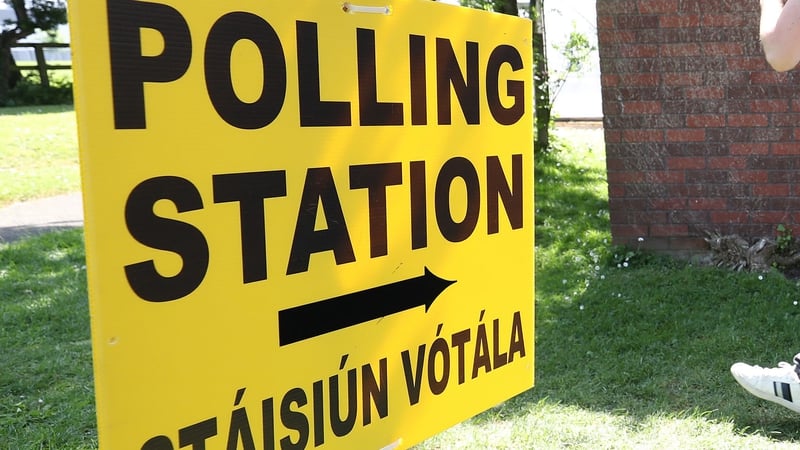Growing concerns over voter apathy ahead of referendums


It was a sure sign of how much Irish values have changed when the Dáil discussed whether “throuples” would be included in the broader definition of a family which will soon be put to a referendum.
For anyone who isn’t up to date with dating trends (or celebrity gossip) a throuple is a romantic relationship involving three people.
In response to questions from the Independent TD, Michael McNamara, Minister for Integration Roderic O’Gorman told the Dáil that neither polygamy nor throuples would be covered under the proposed addition of “durable relationships” to “marriage” as the definition of family in the Constitution.
Leaving aside the fact that under the proposed change, it would be up to the courts to decide the interpretation of “durable relationships” and not any minister, the confusion was a preview of the sort of debate we can expect between now and 8 March.
There will be two separate referendums taking place on that day. The campaigns will get fully under way when the Referendum Commission sends out information to more than two million households from later this week.
People will be asked to vote on two separate referendums on the ballot paper.
Family
The first relates to the definition of the family.
People will be asked to vote Yes or No on whether to make two changes to the wording of the Constitution.
The first is whether to change article 41.1 which reads that: “The State recognises the Family as the natural primary and fundamental unit group of Society, and as a moral institution possessing inalienable and imprescriptible rights, antecedent and superior to all positive law.”
Specifically, the change would insert after the words family, “whether founded on marriage or on other durable relationships”.
The second question within this referendum would alter article 41.3 which says “the State pledges itself to guard with special care the institution of marriage..” to remove the following part: “…on which the family is founded”.
Durable relationships
The early stages of this campaign and the Dáil debate on this so far suggests that the term durable could prove contentious and will require a lot of clear explanation from the Government and those advocating for a Yes vote, if the amendment is to pass.
The Minister has said that the intention is to capture committed relationships that exist between couples and between a parent and children.
But there are concerns from all sides of the argument around how it might be interpreted by the courts.
Sinn Féin TD Sorca Clarke indicated that her party will support it, saying she would take the opportunity of the March vote to “think of all those families and the single parents out there who were considered less in the eyes of the State”.
But she said the lack of a clear explanation on what “durable” means in practice, and its implications for social protection, taxation succession, means there is a heightened risk of misinformation and confusion.
The Labour Party agrees with the need to change the amendment. Its leader Ivana Bacik says the definition “in no way reflects the current and wonderful diversity of family life in Ireland”.
But the party believes that article 41.1 could be left as it is because “it does not restrict the definition of the family in any way”.
Labour believes that article 41.3 should be changed to take out the term “on which the family is based” but does not agree with the proposal to insert the term “durable relationships” arguing it is not clear what it means in practice.
Jennifer Whitmore of the Social Democrats noted that 40% of families are headed by a non-married parent. Her party supported the Labour Party proposal to simply take out “on which the family is based” which she said would be more “practical, clean and simple” than what is being planned.
Immigration fears
The term “durable relationships” has also drawn the referendum into the debate around immigration.
Deputy Michael McNamara raised questions around polygamy in the context of family reunification for migrants already living here.
Another Independent TD, Michael Collins, said the proposed amendment leaves it to the courts to decide what constitutes durable relationships “opening the door for a wide range of interpretations with serious implications for immigration and reunification policies on tax and inheritance rights”.
The Government says the advice of the Attorney General is that there will be no legal impact on immigration law or international protection law from the proposed changes.
Women in the home
A separate referendum to be held at the same time is on care in the home.
It proposes the deletion in its entirety of Article 41.2 which says: “In particular the State recognises that by her life within the home, woman gives to the State a support without which the common good cannot be achieved. The State shall, therefore, endeavour to ensure that mothers shall not be obliged by economic necessity to engage in labour to the neglect of their duties in the home.”
Under the proposal, this would be replaced with article 42 B which would declare that “the State recognises that the provision of care by members of a family to one another by reason of the bonds that exist between them, gives to Society a support without which the common good cannot be achieved and shall strive to support such provision”.
Minister O’Gorman told the Dáil that as it stands the Constitution “does not reflect our values” and that a woman’s place is where she wants it to be. This is likely to be the Government’s central argument in the campaign.
It will need all the support it can get from other political parties and civil society groups if that message is to be heeded.
The National Women’s Council of Ireland (NWCI) took its time to deliberate on the proposed wording because it, like others, wanted more significant change when it came to the recognition of care to include care in the wider community and not just within the family. But NWCI is now on board.
In a big boost to the coalition, Family Carers Ireland is also calling for a Yes vote, saying it is “a potentially watershed moment in our history” and “will be a powerful step towards real change in how we as a nation recognise and value those who care for our most vulnerable”.
Earlier concerns that the definition of care did not go as far as what was recommended by the Citizens’ Assembly appear to have been put aside for now. But it remains to be seen whether this has left a bitter taste, and how active a role these groups will ultimately play.
Another problem that could lead to a referendum defeat for the coalition, is that the outcome of this vote is far more symbolic than immediately tangible. When people are not given a strong reason why they are being asked to vote, they might decide to vote No or just stay away from the polling booth.
The Marriage Equality and Repeal referendums both proposed a very clear and real change to the lives of many. The proposal to abolish the Seanad – in which the Government got, in the words of the Taoiseach of the day Enda Kenny “a wallop” – did not.
When these referendums were announced, the main fear in Government was around the potential for misinformation and confusion.
Added to that now are growing concerns around voter apathy.
So far these referendums have failed to grasp the public imagination. At a time when people are worried about housing, childcare, waiting lists and the cost of living, they might be asking what this is all about.
The Government knows it will need to mobilise the Yes side and put up a convincing campaign if it is to answer that question. If not it could be in for another wallop.




